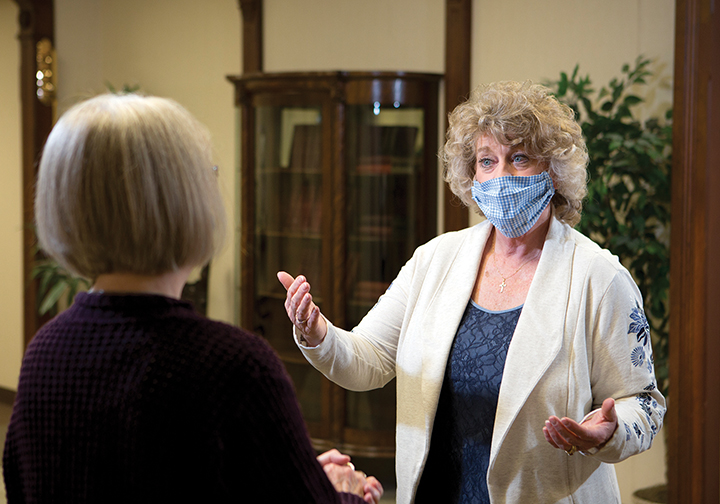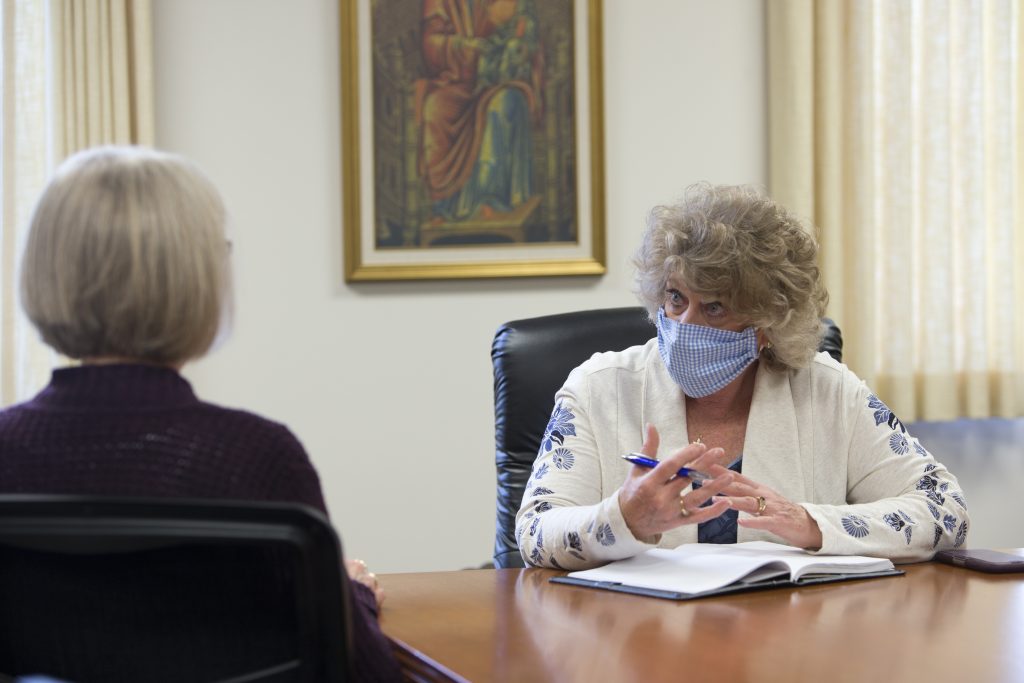Name Change Reflects the Desire to Walk with Victims
By Moira Cullings
“Two years ago, I never thought I would return to a church building, ever,” said Sandra. A survivor of abuse by a representative of the Catholic Church, the journey to find healing for Sandra, whose name has been changed for anonymity, has been difficult. “There’s a sense of loneliness,” she said. “Where do I belong?” Healing from abuse is complicated, and perhaps even more so when the abuse occurred at the hands of a representative of the church, often leaving the victim survivor to feel betrayed and outcast from their faith community. That’s why the office for protection and care for the Archdiocese of Kansas City in Kansas, formerly known as the office of child and youth protection, is working fervently to atone for church abuse by taking responsibility for the harm caused. “Although we cannot turn back time, we can work to prevent abuse today and respond to a survivor’s needs with a sense of urgency and respect,” said director Jenifer Valenti. “An abuse survivor should never feel abandoned by the church, nor should they feel further betrayal when they come forward to report their abuse,” she added. The office’s name change is one way it hopes to communicate that message. “The previous office name highlighted the efforts aimed at protecting children and youth from abuse,” said victim care advocate Linda Slater- Trimble. “While prevention efforts are critical,” she continued, “equally important is the sincere care we have for survivors, as evidenced by our name change.” The change is accompanied by a fresh approach to walking with abuse survivors and honoring their journey and voice, said Valenti. Although the archdiocese has offered services for survivors of church abuse for decades, added Valenti, understanding abuse and the best approach to address it continues to develop. ‘On my time’ Slater-Trimble and Valenti are relatively new to the archdiocese, with Slater-Trimble starting in 2018 and Valenti in 2019. Since then, they’ve been working on fulfilling Archbishop Joseph F. Naumann’s goal of leading the way in how survivors of abuse within the church are cared for. The office began utilizing an accompaniment model and restorative theory, which includes not only offering resources, but listening to the needs of the victim survivor and working at their pace. “One of the great things about the office is everything’s on my time,” said Sandra. “I get to decide when it’s time to do the next step.” That component is huge for Sandra, who said that “with abuse, you’ve lost control.” Sandra had the courage to come forward with her story around two years ago. She explained that reporting her abuse to the archdiocese was difficult and opened up feelings of shame. “But then, there’s a lot of relief at the same time,” she added. “It was like this big bag of mixed emotions when I walked out.”
According to Slater-Trimble, “delayed disclosures are common, [and] so often, victims are adults before they’re able to find their voice and come forward and talk about what happened to them.” What’s made the process easier has been what Sandra describes as a “ministry of presence” provided by the archdiocese. “It’s just having somebody [there on] the days you’re feeling really crazy and just need to blurt out whatever you’re thinking,” she said. “It’s an extremely safe environment for me to be able to do that. “I always say that they’ve walked me through the good, the bad and the very, very ugly.” ‘A safe place’ Sandra’s journey toward healing has given her what she calls “a gigantic gift” — the ability to receive the Eucharist again. “That was the part of church that I missed the most,” she said. But attending Mass isn’t always a simple experience. “My desire is to come back fully, but that is not an easy process,” said Sandra. “There are some things related to the church that trigger me,” she explained. “Prayers can trigger people, songs can trigger people, buildings can trigger people.” Slater-Trimble said those reactions are normal for survivors. “So many people struggle with their relationship with their faith community after something like this has happened to them,” she said. “When it’s an agent of the church, especially clergy, they are their spiritual leader. “And then, to be violated — it hugely impacts a person’s relationship with the church and can sometimes even impact their faith in a loving God.” Slater-Trimble and Valenti hope their work with victim survivors can help the archdiocese continue to improve the response to abuse in the church. Dialogues guided by restorative theory between survivors and church leadership serve as a means towards atonement, said Valenti. “We hope ultimately to be a ministry of hope and healing,” she said. Sandra hopes other survivors of abuse will choose to come forward, too. “It doesn’t matter how long ago this happened to you,” she said. “Secrets will eat you alive. “And telling your story will be incredibly healing for you. It won’t be easy, but it will be really, really healing. “And this is a safe place to do it.”
|
.
Any original material on these pages is copyright © BishopAccountability.org 2004. Reproduce freely with attribution.

